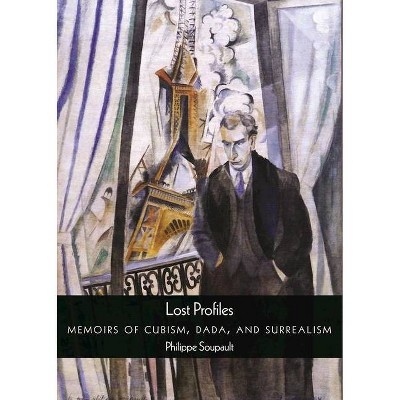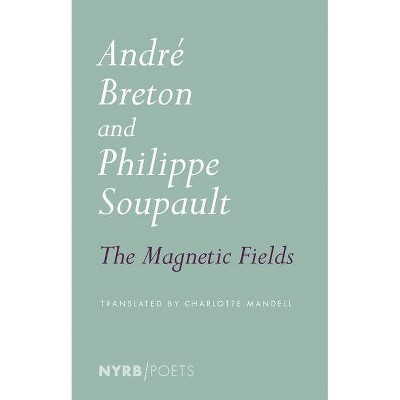Lost Profiles - by Philippe Soupault (Paperback)

Similar Products
Products of same category from the store
AllProduct info
<p/><br></br><p><b> About the Book </b></p></br></br>A retrospective of crucial periods in modernism via portraits of its literary lions by the co-founder of the Surrealist Movement.<p/><br></br><p><b> Book Synopsis </b></p></br></br><p>The gentlest of renegades, the most tender of the French avant-garde poets, the co-author of the first literary work of automatic writing (<em>The Magnetic Fields</em>, 1919), Philippe Soupault was a central figure in both the Dada and Surrealist movements but throughout his long life walked under no banner except the one of artistic freedom. In this previously untranslated book, he gives us a collection of richly remembered portraits of some of his best-loved friends from the old days of the new modernism. A young disciple of the short-lived Apollinaire, the translator of Joyce's <em>Anna Livia Plurabelle</em>, the son of one of Proust's <em>jeunes filles en fleurs</em>, Soupault crossed paths with nearly everyone from that time whose name is still remembered today. As a glimpse into that time, these lost portraits are invaluable--and often deeply moving. The chapter about Proust alone is worth the price of admission, and then there is more, much more packed into the pages of this small, indelible book. Bravo to Alan Bernheimer for having given it to us.--Paul Auster, author of <em>Report from the Interior</em></p> <p>Poets must encourage each other because time is indifferent to the lives that flow through it. Time is what we are made of, but we are a rare school of fish that can see, in Rimbaud's sense, the substance that everyone disregards even as it dissolves them. We have to be young because we are the only force that can slow time down to reveal the beauty of its devastation. Reading Alan Bernheimer's splendid translation of Soupault's memoir, I forgot that it was a translation, that it was Soupault writing or talking about another time, about his friends of one century past. I read myself into these vivid and virile (so, sue me!) assaults on time, and Time stopped.--Andrei Condrescu, author of <em>The Posthuman Dada Guide: Tzara and Lenin Play Chess</em></p> <p>First published in 1963, this charming collection of reminiscences by surrealist poet Philippe Soupault offers warm, generous, appreciative profiles of some of his famous contemporaries. ... Sharp, stylish, and anecdotal, the book offers a fresh glimpse into a fertile artistic world.--<em>Kirkus Reviews</em></p> <p>In [Alan] Bernheimer's graceful translations, Soupault's little reflections on many of his contemporaries give readers the poet's own insights into a host of literary giants ... For anyone interested in early 20th-century literary and artistic movements, Bernheimer's translation is a worthy event.--<em>Publishers Weekly</em></p> <p>Soupault's lively, up-close account underlines the astonishing vitality and versatility of the avant-garde he helped to create and shape. ... Despite his preference for poetry, Soupault writes prose with gusto and élan. He beautifully conveys the passage of time and its impact on individuals and their relationships. ... <em>Lost Profiles</em> captures the restlessness and aspiration of a generation of writers for whom received wisdom was cant, but who could never shake their own self-doubt and propensity for disenchantment.--Paul Maziar, <em>Los Angeles Review of Books</em></p> <p><em>Lost Profiles</em> offers witty and unexpurgated views of a daring era in the Arts when the world became shatteringly altered. These are the memories shared some forty odd years later by one actively involved with multiple fellow players in various scenes of the time. It's a delightful, thought-provoking read that will have those who are already familiar with the material returning to favorite books, while those who are unfamiliar will be busy becoming acquainted with marvelous characters from a key period in world literary history. Even more importantly, <em>Lost Profiles</em> signals a necessary reminder of how much joy there is to be found in discovering terrific, epochal texts freshly translated."--Patrick Dunagan, <em>The Northwest Review of Books</em></p> <p>"[C]harming ... a brief account by a perceptive writer who was on the scene when modernity was young."--<em>National Post</em></p> <p>The attraction of this little book pivots on the first word of its subtitle. Memoirs, yes, but not only just that, considering their author--along with André Breton and Louis Aragon--is a founder of Parisian Dada and surrealism. Charming, deft, the profiles that the author paints of those he knew, and one he didn't, though all to him were friends in truth or feeling, reach out and ever so subtly ensnare. It is not that they reveal anything completely new after nearly a century of scholarship and criticism. Nor is that the point. But freshness is a value, both personal and poetic that, for Soupault, is as natural as breath."--<em>Leonardo</em></p> <p>Soupault's memoir would not be out of place in the company of such minor classics as Ambroise Vollard's <em>Recollections of a Picture Dealer</em>, Manuel Rosenthal's <em>Satie, Ravel, Poulenc</em>, Jean Cocteau's <em>Professional Secrets</em>, or even Ernest Hemingway's <em>A Moveable Feast</em>. ... The accumulation of choice details leaves us with the impression that at an advanced age, Soupault continued to look back on the past fondly--and to inhabit, in his own quiet way, the world that had been explosively dramatized decades earlier by Dada and Surrealism, wherein events counted for more than aesthetic artifacts. Or as Blaise Cendrars had taught him, 'You have to live poetry before you write it; writing, that was superfluous.'"--<em>Rain Taxi</em></p><p/><br></br><p><b> Review Quotes </b></p></br></br><br><p>The gentlest of renegades, the most tender of the French avant-garde poets, the co-author of the first literary work of automatic writing (<i>The Magnetic Fields</i>, 1919), Philippe Soupault was a central figure in both the Dada and Surrealist movements but throughout his long life walked under no banner except the one of artistic freedom. In this previously untranslated book, he gives us a collection of richly remembered portraits of some of his best-loved friends from the old days of the new modernism. A young disciple of the short-lived Apollinaire, the translator of Joyce's <i>Anna Livia Plurabelle</i>, the son of one of Proust's <i>jeunes filles en fleurs</i>, Soupault crossed paths with nearly everyone from that time whose name is still remembered today. As a glimpse into that time, these lost portraits are invaluable--and often deeply moving. The chapter about Proust alone is worth the price of admission, and then there is more, much more packed into the pages of this small, indelible book. Bravo to Alan Bernheimer for having given it to us.--Paul Auster, author of <i>Report from the Interior</i></p><p>Poets must encourage each other because time is indifferent to the lives that flow through it. Time is what we are made of, but we are a rare school of fish that can see, in Rimbaud's sense, the substance that everyone disregards even as it dissolves them. We have to be young because we are the only force that can slow time down to reveal the beauty of its devastation. Reading Alan Bernheimer's splendid translation of Soupault's memoir, I forgot that it was a translation, that it was Soupault writing or talking about another time, about his friends of one century past. I read myself into these vivid and virile (so, sue me!) assaults on time, and Time stopped.--Andrei Condrescu, author of <i>The Posthuman Dada Guide: Tzara and Lenin Play Chess</i></p><p>First published in 1963, this charming collection of reminiscences by surrealist poet Philippe Soupault offers warm, generous, appreciative profiles of some of his famous contemporaries. ... Sharp, stylish, and anecdotal, the book offers a fresh glimpse into a fertile artistic world.--<i>Kirkus Reviews</i></p><p>In [Alan] Bernheimer's graceful translations, Soupault's little reflections on many of his contemporaries give readers the poet's own insights into a host of literary giants ... For anyone interested in early 20th-century literary and artistic movements, Bernheimer's translation is a worthy event.--<i>Publishers Weekly</i></p><p>Like Marc Dachy's essential <i>Discoveries: Dada: The Revolt of Art</i>, Soupault's book--with its pocket size, short chapter format, and reasonable price--makes for the perfect travel companion. Even though the essays presume a certain level of familiarity with the French avant-garde, they have an engaging quality that transmits Soupault's palpable love for experimental art ... <i>Lost Profiles</i> offers witty and unexpurgated views of venturesome men during a daring era ..."--Joseph Nechvatal, <i>Hyperallergic</i></p><p><i>Lost Profiles</i> offers witty and unexpurgated views of a daring era in the Arts when the world became shatteringly altered. These are the memories shared some forty odd years later by one actively involved with multiple fellow players in various scenes of the time. It's a delightful, thought-provoking read that will have those who are already familiar with the material returning to favorite books, while those who are unfamiliar will be busy becoming acquainted with marvelous characters from a key period in world literary history. Even more importantly, <i>Lost Profiles</i> signals a necessary reminder of how much joy there is to be found in discovering terrific, epochal texts freshly translated."--Patrick Dunagan, <i>The Northwest Review of Books</i></p><p>"[C]harming ... a brief account by a perceptive writer who was on the scene when modernity was young."--<i>National Post</i></p><p>The attraction of this little book pivots on the first word of its subtitle. Memoirs, yes, but not only just that, considering their author--along with André Breton and Louis Aragon--is a founder of Parisian Dada and surrealism. Charming, deft, the profiles that the author paints of those he knew, and one he didn't, though all to him were friends in truth or feeling, reach out and ever so subtly ensnare. It is not that they reveal anything completely new after nearly a century of scholarship and criticism. Nor is that the point. But freshness is a value, both personal and poetic that, for Soupault, is as natural as breath."--<i>Leonardo</i></p><p>Soupault's memoir would not be out of place in the company of such minor classics as Ambroise Vollard's <i>Recollections of a Picture Dealer</i>, Manuel Rosenthal's <i>Satie, Ravel, Poulenc</i>, Jean Cocteau's <i>Professional Secrets</i>, or even Ernest Hemingway's <i>A Moveable Feast</i>. ... The accumulation of choice details leaves us with the impression that at an advanced age, Soupault continued to look back on the past fondly--and to inhabit, in his own quiet way, the world that had been explosively dramatized decades earlier by Dada and Surrealism, wherein events counted for more than aesthetic artifacts. Or as Blaise Cendrars had taught him, 'You have to live poetry before you write it; writing, that was superfluous.'"--<i>Rain Taxi</i></p><br><br><p/><br></br><p><b> About the Author </b></p></br></br>A key poet of Parisian modernism, Philippe Soupault (1897-1990) served in the French army during WWI and subsequently joined the antirationalist Dada movement under the leadership of Tristan Tzara. With friends André Breton and Louis Aragon, Soupault co-founded the Dada journal <i>Littérature</i>. In 1919, Soupault collaborated with Breton on the automatic text <i>Les Champs magnétiques</i>, widely considered the foundation of the surrealist movement. He would remain with the movement until 1929, resigning over its increasing politicization. In the years that followed, he wrote novels and journalism, and directed Radio Tunis in Tunisia, where he was imprisoned by the Vichy government during WWII. After the war, he resumed his journalistic activities and also worked for UNESCO. In 1972 he was awarded the Grand Prix de Poésie by the French Academy and he lived long enough the assist with the first complete translation of Breton and his <i>Magnetic Fields</i> in 1985. <p/>Poet Alan Bernheimer's most recent collection is <i>The Spoonlight Institute</i>, published by Adventures in Poetry in 2009. He has lived in the Bay Area since the late 1970s, where he was active in Poets Theater and produced a radio program, "In the American Tree," of new writing by poets. He has translated works by Robert Desnos and Valery Larbaud.
Price History
Price Archive shows prices from various stores, lets you see history and find the cheapest. There is no actual sale on the website. For all support, inquiry and suggestion messagescommunication@pricearchive.us




















